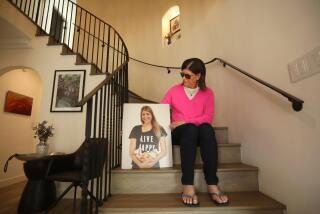Christine Maggiore, vocal skeptic of AIDS research, dies at 52
- Share via
Until the end, Christine Maggiore remained defiant.
On national television and in a blistering book, she denounced research showing that HIV causes AIDS. She refused to take medications to treat her own virus. She gave birth to two children and breast-fed them, denying any risk to their health. And when her 3-year-old child, Eliza Jane, died of what the coroner determined to be AIDS-related pneumonia, she protested the findings and sued the county.
On Saturday, Maggiore died at her Van Nuys home, leaving a husband, a son and many unanswered questions. She was 52.
According to officials at the Los Angeles County coroner’s office, she had been treated for pneumonia in the last six months. Because she had recently been under a doctor’s care, no autopsy will be performed unless requested by the family, they said. Her husband, Robin Scovill, could not be reached for comment.
Jay Gordon, a pediatrician whom the family consulted when Eliza Jane was sick, said Monday that Maggiore’s death was an “unmitigated tragedy.”
“In the event that she died of AIDS-related complications, there are medications to prevent this,” said Gordon, who disagrees with Maggiore’s views and believes HIV causes AIDS. “There are medications that enable people who are HIV-positive to lead healthy, normal, long lives.”
Diagnosed with HIV in 1992, Maggiore plunged into AIDS volunteer work -- at AIDS Project Los Angeles, L.A. Shanti and Women at Risk. Her background commanded attention. A well-spoken, middle-class woman, she was soon being asked to speak about the risks of HIV at local schools and health fairs. “At the time,” Maggiore told The Times in 2005, “I felt like I was doing a good thing.”
All that changed in 1994, she said, when she spoke to UC Berkeley biology professor Peter Duesberg, whose well-publicized views on AIDS -- including assertions that its symptoms can be caused by recreational drug use and malnutrition -- place him well outside the scientific mainstream.
Intrigued, Maggiore began scouring the literature about the underlying science of HIV. She came to believe that flu shots, pregnancy and common viral infections could lead to a positive test result. She later detailed those claims in her book, “What if Everything You Thought You Knew About AIDS Was Wrong?”
Maggiore started Alive & Well AIDS Alternatives, a nonprofit that challenges “common assumptions” about AIDS. She also had a regular podcast about the topic.
Her supporters expressed shock Monday over her death but were highly skeptical that it was caused by AIDS. And they said it would not stop them from questioning mainstream thinking.
“Why did she remain basically healthy from 1992 until just before her death?” asked David Crowe, who served with Maggiore for a number of years on the board of the nonprofit Rethinking AIDS. “I think it’s certain that people who promote the establishment view of AIDS will declare that she died of AIDS and will attempt to use this to bring people back in line. But you can only learn so much from an unfortunate death.”
Brian Carter, who facilitated local peer groups with Maggiore, said the movement would remain strong.
“Christine was only part of this. There is an outstanding number of prominent rethinkers, independent thinkers, doctors, scientists, lawyers who question AIDS causation.”
Though they run counter to the scientific consensus about AIDS, such beliefs can have a major effect. In South Africa, where about 5.7 million people live with HIV, the government refused until 2005 to fund antiretroviral treatment, citing questions about the effectiveness of the drugs that inhibit the replication of HIV.
Federal health officials and other experts say the link between HIV and AIDS has been shown in hundreds of studies and the prescription of antiretroviral drugs has helped reduce the pandemic to a chronic but manageable disease in the United States. Researchers from the Harvard School of Public Health calculated earlier this year that the South African government’s delay in introducing treatment between 2000 and 2005 cost more than 330,000 lives in that country.
Craig Thompson, executive director of AIDS Project Los Angeles, said Maggiore was an effective and powerful advocate, in part because she was a woman living with HIV. But he said her message discouraging testing and treatment was dangerous.
“It’s just really sad that she never could understand and never could trust the medical community, unlike the rest of the world,” Thompson said.
Maggiore’s friends said she underwent a holistic “cleanse” last month that left her feeling ill.
“She was telling me that she wasn’t feeling great,” Carter said, adding that he questioned whether the pneumonia was related to AIDS.
As an advocate, Maggiore counseled HIV-positive pregnant women on how to avoid pressure to use the drug AZT as a method to reduce the chances of transmission to their babies. She considered the drug toxic.
Maggoire gave birth to her son, Charlie, and his younger sister, Eliza Jane, at home and breast-fed both, although research indicates that it increases the risk of transmission. Eliza Jane Scovill died in 2005 from what the coroner ruled was AIDS-related pneumonia. Maggiore and Scovill, however, hired a pathologist who concluded that the girl died of an allergic reaction to the antibiotic amoxicillin.
After Eliza Jane’s death, Los Angeles police investigated whether Maggiore and Scovill were negligent in not testing the girl for HIV. In 2006, the Los Angeles County district attorney’s office decided not to file criminal charges against Maggiore, saying that it would have been difficult to prove criminal negligence because Maggiore had sought medical advice. Friends said that Maggiore never fully recovered after the death of her daughter and that she had trouble even sleeping and eating. Her preteen son, Charlie, has tested HIV negative.
Last year, Maggiore and Scovill sued Los Angeles County and others on behalf of their daughter’s estate, charging that the autopsy report lacked proper medical and scientific evidence for the declared cause of death. The case is pending.
More to Read
Sign up for Essential California
The most important California stories and recommendations in your inbox every morning.
You may occasionally receive promotional content from the Los Angeles Times.









